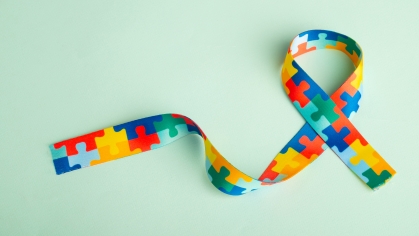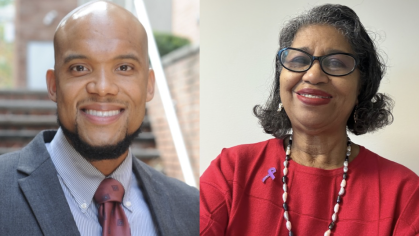E. Goldblatt Hyatt is DSW Program Director and Associate Professor of Professional Practice for Reproductive Justice at Rutgers School of Social Work. We spoke to them about the significance of LGBT History Month and ways social workers can commemorate it in October and beyond.
Tell us a bit about your journey to social work.
From a very early age, I was aware of social justice issues, mainly through the work of my father, a Canadian labor lawyer who has always been at the forefront of civil rights work. Though I never planned on becoming a social worker, I was ultimately called to the field through an ongoing fascination with death and dying and how I could identify a vocation that helped me to find meaning while supporting others through that difficult process. This led me to getting a dual degree in social work and bioethics (MSW/MBE) and ultimately a doctorate in social work (DSW). My primary area of focus is reproductive justice and supporting the right to have a child, not have a child, and parent in safe and sustainable communities. I am also a passionate member of the LGBTQIA++ community and find myself drawn more and more into practice and advocacy issues with this population. I am the faculty liaison for Social Workers Advocating for GLTB and Gender non-conforming Equal Rights (SWAGGER) here at Rutgers School of Social Work.
What is the significance of LGBT History Month for you?
Visibility, inclusion, and equal rights have always been goals for the queer community. LGBT History Month began in 1994, but the queer community was active and advocating for recognition long before that. Though queer people have existed throughout millennia, it wasn’t until 1924 that the first gay rights society formed in the United States. Today’s social work students and practitioners are probably most familiar with the Stonewall Uprising where LGTBQIA++ people most notoriously uprose to fight back against the raid of a gay bar and defended themselves from police violence, ultimately increasing visibility and advocacy on the part of the queer community. Historical events where marginalized people stood up for their rights are significant for me as I honor my queer elders in their push to be seen, heard, and have a seat at the table where social justice decisions are being made. Without the activism and advocacy of the queer community, systems would not have changed and queer folks, though still encountering marginalization today, would not have access to life-saving services that include inclusive and supportive counseling, medical services, and gender-affirming care. Having personally received gender affirming care that allowed me to live more authentically as a non-binary person, I am so grateful for the recognition of the struggles and overcoming of the queer community that we honor during LGBT History Month.
How can the social work community recognize and commemorate LGBT History Month?
Learn the history of queer rights movements to be fluent enough to discuss their significance with clients, change-makers, politicians, and other stakeholders. In fact, incorporating discussion of the significance of this month in therapeutic environments can be extremely validating for the queer populations social workers serve. Take some time to reflect on what allyship means to you: are you engaging only in performative activism, or are you truly walking the walk and supporting the needs of queer people both in and out of the social work sphere? Incorporate a discussion of LGBTQIA++ history into sessions with clients where appropriate. Attend commemoration events: show up in spaces where LGBT history is being discussed and honored. Find activities that destigmatize while honoring and supporting queer joy, like Drag Story Hour.
What can the social work profession or social workers do to continue to support the importance for Individuals for LGBT History Month beyond this month?
The ACLU is currently tracking 527 anti-LGBTQ bills across the United States, ranging from the censorship of queer history curriculum to banning trans athletes to forcing teachers to “out” their students to dismantling gender-affirming healthcare and more. Social workers must be aware of the contemptuous legislative environment in which queer people are forced to endure assaults on their identities. Social workers need to be active in openly challenging legislative attempts to restrict queer people’s bodily autonomy, ensuring we are always honoring the dignity of the populations we serve. This may mean writing letters, showing up to school board meetings, and contacting local and state legislators. In fact, social workers can take an active role in penning legislation that unequivocally enshrines the rights of queer people. It is not enough to stop discriminatory legislation; we must counteract it.
Observing LGBT History Month means making a commitment, year-round, to true allyship and activity within queer spheres. For example, Transgender Day of Remembrance is an annual event that honors those whose lives were lost due to violence against transgender people, and social workers should be mindful that this day is important for the trans community, weaving it into clinical and macro-based work where appropriate.
Social workers must also be aware that queer folks face an increased risk of intimate partner violence and discrimination in healthcare spheres and be ready to address with clients how to find resources, support, and advocacy.
Social workers should be aware of intersectionality and the fact that our clients have multiple identities and lived experiences that may mark them for marginalization and oppression. Being queer is not the only potentially stigmatized identity a client can have, and social workers must be sure to incorporate awareness of all the ways clients can experience harm.
Social workers should endeavor to be true allies and supporters every day, beyond LGBT History Month.
This story was created in partnership with Rutgers School of Social Work's Inclusion, Intersectionality, Diversity, Equity, and Advancement (IIDEA) Committee.



